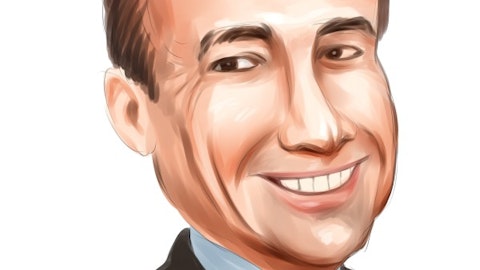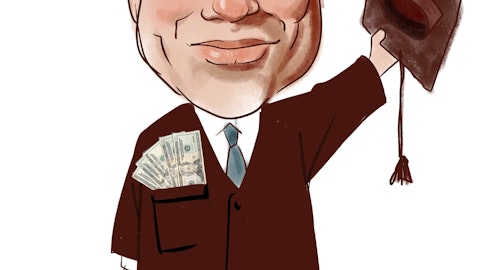Joel Greenblatt founded Gotham Asset Management in 1985 with $7 million. Greenblatt primarily uses a value investing strategy focused on finding value in special situations, but he also uses a quantitative investment strategy, which he calls his “magic formula.” The strategy has been successful. Gotham Asset’s Formula Investing U.S. Value 1000 fund gained 1.7% in 2011, compared to a loss of roughly 4 percent for the average hedge fund. In spite of relatively modest success, Gotham Asset’s 13F portfolio increased dramatically in the fourth quarter. The fund went from having $613.79 million spread across 588 positions at the end of the third quarter to 644 holdings with a total value of $828.71 million at the end of the fourth quarter.

The largest of these positions is a 334,491-share stake in SPDR S&P 500 ETF Trust (SPY), valued at $41.98 million. Greenblatt isn’t in the business of investing in index funds. This is clearly a position where Greenblatt keeps his investors’ funds until profitable opportunities show up. Alternatively, he might want to keep about 5% of his portfolio in index funds in case some of his investors unexpectedly want their money back. It is easier to sell SPY than some of the mid-cap stocks he has been holding in his portfolio in such a short notice.
Gotham Asset’s second largest position at the end of the fourth quarter was KLA-Tencor Corp (KLAC). The fund had 232,412 shares, valued at $11.21 million, in the company at the end of December. Greenblatt had been bullish on KLA-Tencor during the third quarter – his Gotham Asset owned 211,568 shares of the company at the end of September, valued at just under $8.1 million – but it was only his sixth largest position at the end of the third quarter.
We can see why Greenblatt became more aggressive with the stock during the fourth quarter. The stock ranged from $36.62 a share to $49.39 a share in the period from October through December. When the markets opened on February 17, KLA-Tencor was trading at $51 a share, meaning Greenblatt has already made money on the position. Plus, the stock carries a mean one-year target estimate of $56.89 a share. In addition to the upside, the company also pays a $1.40 dividend (2.80% yield). Even with such strong performance, KLA-Tencor is still a bargain – it is priced at just 11.12 times its future earnings. KLA-Tencor’s closest competitor is Applied Materials (AMAT). Applied Materials opened trading on February 17 at $13.89 a share, on a mean one-year target estimate of $13.28. Further, the company pays a lower dividend at 32 cents a share (2.50% yield) and it is priced slightly higher relative to its future earnings, with a forward P/E of 11.85. Looking at the comparison, it is clear why KLA-Tencor is the winner.
Greenblatt was also bullish about Dolby Laboratories (DLB) at the end of the fourth quarter. His Gotham Asset owned a stake in the company worth $11.11 million, or 363,988 shares, at the end of December. This is a strong increase from the end of September, when the fund owned just 249,697 shares in the company, worth $6.85 million. At first glance, we didn’t think this company was worth it. When the markets opened on February 17, Dolby was trading at $39.52 a share on a mean one-year target estimate of $39.88 (range $35 to $45), and it did not pay a dividend. It traded in the $25.70 to $33.95 range during the fourth quarter, so Greenblatt likely made more than 20% on the investment. Currently the stock is trading at 15.4 times its forward earnings and it is expected to increase its earnings by about 15% annually over the next five years. Usually we would have recommended this stock but there are cheaper technology stocks out there with similar growth characteristics.
Gotham Asset also held significant positions in Apollo Group (APOL), Forest Labs (FRX), Medicis Pharmaceutical Group (MRX), Northrop Grumman (NOC), Raytheon (RTN), Dell (DELL) and Gamestop (GME) at the end of the fourth quarter. Dell is one of our favorite picks in this group and we initiated a new position in this stock after confirming that David Einhorn bought this stock as well. Dell has nearly $7 per share in cash and investments and currently earns about $2 per share. Net of cash and investments the stock’s PE multiple is less than 6. We believe Dell will use its cash hoard to buy back shares at this cheap multiple which will benefit shareholders tremendously. Hewlett-Packard (HPQ) is another stock with extremely low multiples but the new management needs to prove itself before we make a long-term investment in it. HPQ has a forward PE ratio of 7.2 and is projected to grow at middle single digits annually over the next five years.





